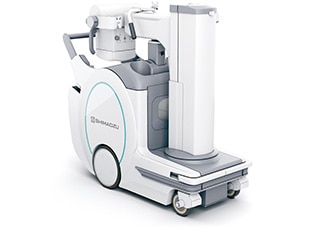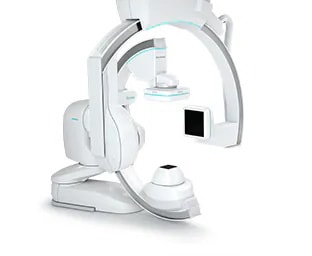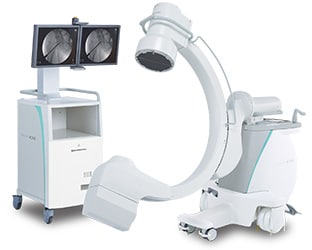Emergency Medicine / ER

Shimadzu Angiography and Mobile Systems offer a variety of applications that can be quickly launched and responded with low-dose & high-quality images, and excellent operability to support rapid and accurate diagnosis & treatment, which is significant in emergency medicine. New technology has also been developed to help rehabilitation during follow-up so that patients can return to their everyday life as soon as possible after surgery.

*1: For Research Use Only. Not for use in diagnostic procedures.
*2: This technology/measure is still currently in research and development. For research use only. Not for use in diagnostic procedures.
Clinical Use
Mobile radiography
Treatment time is critical for saving lives and reducing paralysis. Fast boot-up of digital operation console in 1 minute enables ER staff to see diagnostic images on the on-board reference display for pre-diagnosis and continue treatment without delay.
The large field-of-view to cover the entire region, on-site quick image verification, and design for fast action greatly support operators. (Specifications and available functions vary depending on the system, FPD model, etc.)
Mobile X-ray system
 Digital Radiography Mobile X-ray System MobileDaRt Evolution™ Series
Digital Radiography Mobile X-ray System MobileDaRt Evolution™ SeriesClinical Use
Angiography
A variety of immediate applications supports emergency intervention, including real-time, highly motion-tolerant image-guiding features. High-quality, low-dose, real-time image guidance can be performed even in emergencies when 3D imaging is not available by CT, MRI, or Angiography system before treatment. The human-centered experience enables operators to focus on their treatment with a simple workflow. (Available functions depend on the system model, etc.)

OPESCOPE ACTENO, a mobile C-arm imaging system, realizes free and easy positioning and quick image display under fluoroscopy, providing optimal performance for emergency room needs. The fully counter-balanced C-arm provides extra-light, quick movements, and positioning. This intuitive operability supports fast and accurate studies.

Technology
Rehabilitation support by fNIRS
For paralytic symptoms caused by cerebrovascular disease, it is said that starting appropriate rehabilitation at an early stage is important. Functional Near-Infrared Spectroscopy (fNIRS) is a new technology that can monitor changes in brain activity before and after rehabilitation and visualize the effects. It supports effective rehabilitation by selecting the best rehabilitation method for patients and increasing patients' motivation.
Functional Near-Infrared Spectroscopy System for Research
LABNIRS
Portable functional Near-Infrared Spectroscopy System for Research
LIGHTNIRS
* This technology/measure is still currently in research and development. For research use only. Not for use in diagnostic procedures.
Technology
Motor function training support by NIRS neurorehabilitation
NIRS neurorehabilitation is a new rehabilitation system that combines a near-infrared imaging system (NIRS) with Shimadzu’s unique neurofeedback technology. Neurofeedback is a method of restoring or training specific brain functions by using a NIRS system or other brain function measuring instruments. With this method, brain activity measurements or analysis results are shown to the patient during rehabilitation tasks and enable them to change their brain activity consciously. This allows efficient motor function training through the conscious control of brain activity. Consequently, it is expected to be much more effective than previous rehabilitation methods, especially for stroke patients.
NIRS Neurorehabilitation
* This technology/measure is still currently in research and development. For research use only. Not for use in diagnostic procedures.


